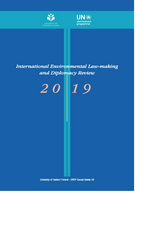Externe Publikationen

Gaps and opportunities for synergies in international environmental law on climate and biodiversity to promote the Sustainable Development Goals
Rantala, Salla / Gabriela Iacobuta / Stefania Minestrini / Julika TribukaitExterne Publikationen (2020)
in: Honkonen, Tuula / Seita Romppanen (eds.), 2019 International Environmental Law-making and Diplomacy Review, Joensuu, Finland: University of Eastern Finland, 58-99
ISBN: 978-952-61-3467-3
Volltext/Document
It has been argued that achieving the SDGs requires knowledge about the interactions between different SDGs; i.e., how action to promote a specific goal or target supports or hinders the achievement of the other goals. Previous analysis has identified both trade-offs as well as synergies between efforts that intend to pro-mote different goals. Though the SDGs are grounded in existing commitments expressed in various international agreements and soft law instruments, there is scarce explicit empirical analysis of how the interactions between different SDGs are addressed by the international legal framework, particularly international environmental law (IEL). Most international institutional arrangements tend to operate in relative isolation, and the potential of the SDGs, as ‘integrated and indivisible’, to introduce coherence remains an open question.
In this paper, we focus on the interactions between climate action (SDG 13) and halting (terrestrial) biodiversity loss (SDG 15) vis-à-vis the international legal framework; in particular, the relevant major legal instruments: the United Nations Framework Convention on Climate Change (UNFCCC)20 and the Convention on Biological Diversity (CBD). First, we review the drivers of climate change and biodiversity loss and identify actions that would likely harness synergies in efforts to promote SDGs 13 and 15 based on existing literature. An analytical framework, including a set of focus areas and related keywords, is derived from the review. The UNFCCC and CBD are then analyzed for their potential to support harnessing those synergies, as well as the extent to which they address potential trade-offs between SDGs 13 and 15. Concurrently, we analyze how the interactions between SDGs 13 and 15 are addressed in the context of the United Nations Environment Assembly (UNEA), as a way of looking ahead at future plans through current political discourse.
Both CBD and UNFCCC address the direct drivers as well as some of the indirect drivers causing climate change and biodiversity loss, although with varying emphasis. The two Conventions make reference to each other, and the interactions between climate and biodiversity are acknowledged from multiple perspectives; that climate change can lead to biodiversity loss, but climate action could also affect biodiversity and ecosystems, and that biodiversity protection and enhancements are an important element in regulating the climate. However, further strengthening of policy coherence between the two strands in needed. Moreover, concrete binding measures are missing in the case of most drivers and some important topic areas remain largely unaddressed in at least one or in both conventions: agriculture, soil degradation and wetlands conversion, biofuel impacts, among others. While explicit references to interactions between climate change and biodiversity loss are sporadic at best in the UNEA resolutions, and they do not yet seem to represent many new openings on better accounting for interactions in international cooperation, the strongest potential for addressing widely synergistic action concerns the UNEA focus on sustainable consumption and production (SDG 12).
Kontakt
Cornelia Hornschild
Koordinatorin Publikationen
E-Mail Cornelia.Hornschild@idos-research.de
Telefon +49 (0)228 94927-135
Fax +49 (0)228 94927-130
Alexandra Fante
Bibliothekarin/Open Access-Koordinatorin
E-Mail Alexandra.Fante@idos-research.de
Telefon +49 (0)228 94927-321
Fax +49 (0)228 94927-130



